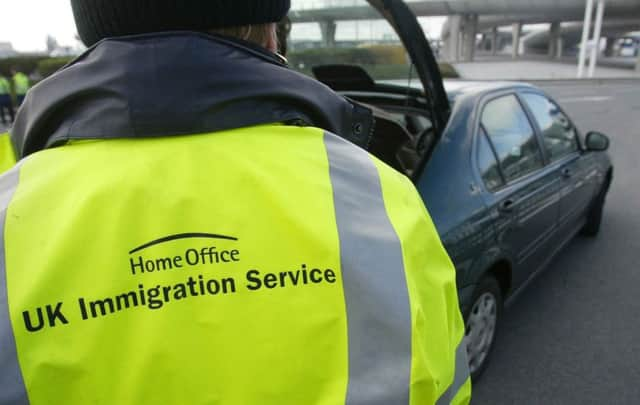'˜Hopelessly out of control': Migration soars to near-record as EU poll nears


The key measure - the difference between the number of people arriving and leaving the country - was estimated at 333,000 for the year ending December 2015.
This is 3,000 short of the all-time high posted last year, 10,000 higher than the figure published for the 12 months to September, and three times the Government’s target level.
Advertisement
Hide AdAdvertisement
Hide AdStatisticians said the increase was the result of a fall in emigration, with immigration at a similar level to the previous year.
Net migration of EU citizens was estimated at 184,000 - the joint highest figure on record. This was up compared to the previous year, when it stood at 174,000, but this was not a “statistically significant” change.
The apparent rise was largely due to an increase in net migration of citizens from Bulgaria and Romania, from 44,000 to 58,000, the Office for National Statistics (ONS) said.
EU immigration - just the number of people coming to the UK - stood at 270,000, compared to 264,000 in the previous year.
Advertisement
Hide AdAdvertisement
Hide AdThe figures - the last official set of immigration statistics to be published before next month’s referendum - provoked a fresh confrontation between the two camps.
Immigration minister James Brokenshire conceded net migration from outside and within the EU “remains too high”.
The figures underline that there are “no quick fixes or simple solutions”, he claimed, insisting that leaving the EU is “absolutely no panacea or silver bullet whatever some may suggest”.
Ukip leader Nigel Farage said he believed many more were arriving than the official numbers suggested,
Advertisement
Hide AdAdvertisement
Hide Ad“Mass immigration is still hopelessly out of control and set to get worse if we remain inside the EU, going on with disastrous open borders,” he said.
“However, I don’t believe these official figures and I’m sure the real numbers are much higher.”
Boris Johnson, who is campaigning for Brexit, said the figures mean “we are adding a population the size of Oxford to the UK every year just from EU migration”.
The former London Mayor insisted a vote to leave is the “only way to take back control of immigration”.
Advertisement
Hide AdAdvertisement
Hide AdAnalysts argued headline figures provide little information about how EU migration affects the UK and its residents.
Madeleine Sumption, director of the Migration Observatory at the University of Oxford, said it was unclear what impact a vote to leave would have on migration.
“EU exit could mean significant new restrictions on EU migration, but it’s also possible that the impact would be very small if the UK remains part of the European single market,” she said.
“At the same time, staying in the EU does not mean that migration will remain at current levels forever. EU migration could be either higher or lower in the future if the UK votes to remain.”
Advertisement
Hide AdAdvertisement
Hide AdLord Green of Deddington, chairman of campaign group Migration Watch UK, said the figures “show that no progress is being made in reducing immigration”.
Chai Patel of the Joint Council for the Welfare of Immigrants said: “Individual numbers, when taken in isolation, are poorly placed to show the positive impact that migration has had on the UK.”
The ONS said the overall net long-term migration figures - covering those coming for at least 12 months - are “not very different” to those published in the last quarterly report.
Reports released by the body also revealed:
• Non-EU net migration was estimated at 188,000 - down slightly compared to the previous year.
Advertisement
Hide AdAdvertisement
Hide Ad• Some 308,000 people came to Britain for work - an jump of 30,000 from the previous year and the highest estimate on record.
• Of these, 178,000 (58%) had a definite job to go to and 130,000 (42%) arrived looking for work, with the latter figure a “statistically significant” rise.
• There were 630,000 National Insurance Number registrations by EU nationals in the year ending in March - a similar level to the previous 12 months.
• Using the broadest definition, short-term immigration of between one and 12 months for all reasons was 1.2 million in the year ending June 2014, a rise of 110,000 visits year-on-year.
• In 2014, 13%, or 8.3 million, of the UK resident population were born outside the UK - up from 9%, or 5.3 million, in 2004.